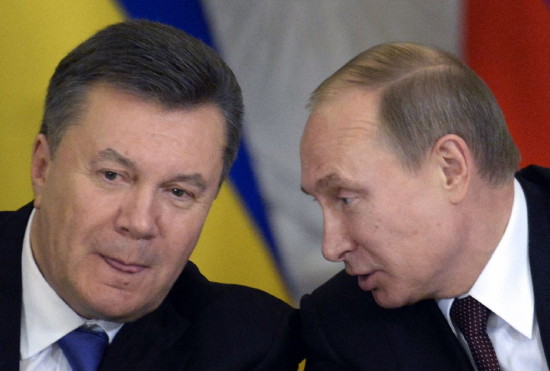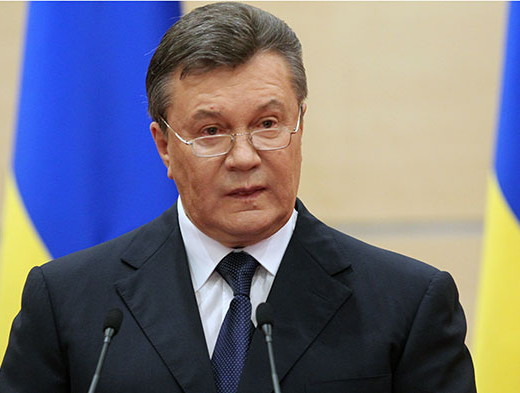Yanukovych, Viktor
Yanukovych, Viktor [Янукович, Віктор; Janukovyč], b 9 July 1950 in Yenakiieve, Donetsk oblast. Prime minister (2002–5 and 2006–10) and fourth president (2010–14) of independent Ukraine, politician; his rule as president resulted in mass popular protests that evolved into the Euromaidan Revolution or Revolution of Dignity in 2013–14. A graduate (1973) of the mining tekhnikum in Yenakiieve, Yanukovych has a master’s degree in international law as well as a doctorate in economics (1999; from the Donetsk-based Institute of Economic and Legal Research of the National Academy of Science of Ukraine). His official biography stated that, as of 2007, he had authored or co-authored nearly 30 scholarly-scientific works including several books. However, his education and his academic record have been seriously questioned. For example, the book Opportunity Ukraine that he apparently authored was dismissed as a work of ‘banal plagiarism.’ In his youth Yanukovych was twice convicted and incarcerated for participating in robberies and assaults. He began working in his specialty of automotive transport at a motor depot in 1972, advancing within the bureaucracy to head a corresponding branch of the Donetsk administration by 1994. Two years later, he was co-opted into the central office of government administration, and in 1997 became head (governor) of the Donetsk oblast state administration. He retained this post until 2002. From then until January 2005 he served as prime minister under President Leonid Kuchma. With the latter’s half-hearted support he contested the presidential election of 2004 against Viktor Yushchenko, but lost out on account of vote fraud exposed in the course of the Orange Revolution.
In April 2003, Yanukovych had become head of the Party of Regions on whose list he was elected to the Supreme Council of Ukraine in the general election of 2006. Later that year, because his party had won a plurality of seats in the Supreme Council, and together with the Communist Party of Ukraine and socialists was able to form a majority, he resigned his seat to become prime minister under President Viktor Yushchenko. A power struggle ensued between the latter two, and Yanukovych resigned in December 2007, being replaced by Yuliia Tymoshenko. Tymoshenko negotiated an unfavourable agreement for Russian gas, which provided the basis for later being charged with ‘abuse of power’ and sentenced to seven years in prison. Yanukovych bided his time as his popularity outstripped that of Tymoshenko. In the wake of the 2008 market crash, Yanukovych as leader of the largest party in the Supreme Council allied with Yushchenko to block needed structural reforms attempted by Tymoshenko; the three of them, meanwhile, also engaged in negotiations on further constitutional changes that were fruitless.
In 2010, with help from American political consultant Paul Manafort, he again contested the presidency winning this time by a plurality of votes over his opponent, Yuliia Tymoshenko. It was a victory brought on not so much by his personal electoral appeal as by the self-defeating policies of Viktor Yushchenko whose record of incompetence and infighting while in office disappointed many former supporters of the Orange Revolution. In the decisive second round of presidential elections Yushchenko himself pleaded with voters not to elect Tymoshenko, his supposed ally. In both the 2010 and 2004 elections, Yanukovych ran as candidate of the Russian-speaking electorate in eastern and southern Ukraine as well as of the country’s leading business tycoons such as Rinat Akhmetov, Dmytro Firtash, and Andrii Kliuiev, all of whom backed him.
Yanukovych’s term as president was notable for reinstating the 1996 Constitution, reversing much of his predecessor’s policies, accumulating personal wealth for himself and members of ‘the family,’ augmenting his own presidential powers by means external to the constitution, openly persecuting his political opponents, and initiating or pretending to initiate needed political reforms to satisfy international donors, but without completing any of them. The trend in his internal policies from the very start was definitely towards autocracy and authoritarianism, quite the opposite of his ‘for the people’ campaign theme or of Ukraine’s main goal of democratization and marketization.
On 1 October 2010, a pliant Constitutional Court overturned the 2004 amendments to the Constitution of Ukraine, thus reverting the Ukrainian political system to a presidential-parliamentary arrangement. This gave President Yanukovych broad powers of appointment which he used to consolidate his powers of office as well as to overshadow the Supreme Council of Ukraine and the government. In addition, by modifying the Supreme Council’s internal rules his Party of Regions achieved a majority and the head of the party, Mykola Azarov, became prime minister, able to determine the government’s policy agenda and push it through parliament. Oblast governors also became heads of the Party of Regions in their jurisdictions. The Party of Regions thus was made into the new party of power, dominant even in local governments. It became in effect a superpresidential system.
Under Yanukovych many policies introduced by Viktor Yushchenko’s administration, which dealt with education and questions of Ukrainian identity (such as the recognition of the Holodomor as a genocide) were also reversed. Textbook references to the Second World War were amended restoring the Soviet Great Patriotic War narrative. And in advance of the 2012 Supreme Council of Ukraine elections, Yanukovych by way of appealing to Russophone voters signed into law a bill expanding official use of the Russian language.
His principal political opponent, Yuliia Tymoshenko, along with her former interior minister, Yurii Lutsenko, and many others, were charged with offences, tried, convicted, and imprisoned. This was indicative of Yanukovych’s control over the judicial system as well as his personal political vindictiveness. Yanukovych’s elder son, Oleksandr, together with his cronies, were appointed to positions in government and banking which enabled them to pursue their own enrichment through rent-seeking, gas trading, and preferential contracts. The president himself acquired an ostentatious palatial estate in Mezhyhiria near Kyiv which later became a museum of his opulent self-indulgence.
Ukraine’s need, meantime, for serious social, political, and economic reforms was addressed by Yanukovych inconsistently and apparently unwillingly. Fiscal stabilization was achieved, but only thanks to International Monetary Fund (IMF) intervention. Other reforms, such as pensions, were due to IMF prodding, and then were only partially achieved. Administration reform resulted instead in effectively enhancing presidential power. Anticorruption efforts were completely unsuccessful, except as a political weapon, while other areas such as local government, infrastructure, housing, and labour legislation remained unaddressed.
In foreign policy Yanukovych oscillated between the European Union (EU) and the Russian Federation. He paid his first official visit abroad to Brussels, but followed this up by signing the Kharkiv Pact with Russian President Dmitri Medvedev. That document extended the Russian Federation’s naval base lease in Sevastopol to 2042, and lowered the price of Russian gas by $100 per 1000 m3. This was followed by a law proclaiming Ukraine’s non-aligned status (oddly incompatible with the Russian Federation’s Black Sea Fleet being permanently in the Crimea), and rejection of Viktor Yushchenko’s aspiration towards a NATO Membership Action Plan. Both of these developments were meant to mollify the Russian Federation. At the same time, Yanukovych was encouraged by the EU and also motivated by domestic economic considerations to accelerated Ukraine’s European integration. After his first year in office Yanukovych’s approval ratings plunged and did not recover due to public dissatisfaction with the state of the economy, which did not bode well for the anticipated 2015 elections. In April 2013, in response to international pressure, he pardoned Yurii Lutsenko and announced plans to sign the Association Agreement with the EU at its summit in November in Vilnius. Then in October 2013, during his meeting with Russian President Vladimir Putin, Yanukovych made a commitment to deepening cooperation with the Russian-led Customs Union, described as beneficial for Ukraine. But his oligarch backers did not welcome the prospect of being swallowed by the larger counterparts and this created a dilemma.
At the Vilnius summit itself, Yanukovych unexpectedly postponed signing the Association Agreement and the Deep and Comprehensive Free Trade Agreement (DCFTA) with the EU, citing his country’s lack of progress on the reforms required by the EU and IMF. In fact, he could not accept the political risk of releasing Yuliia Tymoshenko, which was one of the EU’s key demands. The other, reform of the prosecutorial service, would deny him control of the courts. He was also responding to economic and political threats from Moscow, of which Ukraine had already been given a foretaste. Therefore, a fortnight later he accepted President Vladimir Putin’s offer of a $15 billion US loan, a lowering of the gas price from $400 to $268.50 per 1000 m3, and termination of the informal blockades on Ukrainian exports to the Russian Federation.
This simple deferral to another day of a decision on a complicated matter of international relations launched the Euromaidan Revolution of 2013–14. The unanticipated storm of opposition—initially to the postponement, eventually to the corrupt regime in its entirety—was responded to by Yanukovych in characteristically inconsistent and incoherent manner. When ultimately an agreement facilitated by foreign intermediaries was rejected by the protesters, and his Party of Regions supporters began deserting him, Yanukovych fled Kyiv, ending up in Rostov-on-Don as President Vladimir Putin’s guest. From there he proclaimed himself still Ukraine’s legal head of state. On 22 February, 2014, he was removed from office by a 328-member majority of the Supreme Council of Ukraine.
In exile, Yanukovych vowed to return. This was unlikely to happen soon, as in January 2019, he was convicted in absentia by a Kyiv district court of treason and sentenced to 13 years in prison. A convicted criminal in his youth, Yanukovych now ended his career as he began it. His record as governor, party leader, and president illustrates well the enduring features of post-Soviet Ukrainian politics: an unsettled constitutional playing field; an impulse towards the ‘strong hand’ of superpresidentialism; shadowy links between politics, business, and organized crime; predation, kleptocracy, and corruption; and all this against a background of recurrent economic crisis.
BIBLIOGRAPHY
Riabchuk, Mykola. Gleichschaltung: Authoritarian Consolidation in Ukraine: 2010–2012 (Kyiv 2012)
Bohdan Harasymiw
[This article was written in 2019.]

.jpg)
.jpg)
